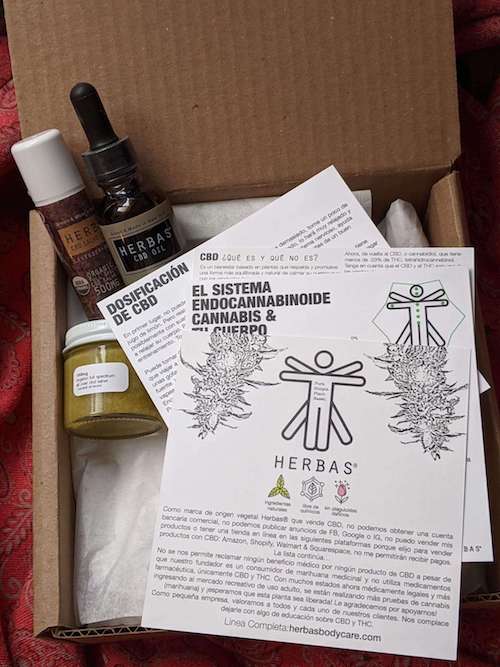From fashion to food, it is often thought that the higher the price, the better the product. At Herbas, a plant-based body care brand, price does not reflect its products, but the needs of its customers. Founder Miriam Aristy-Farer champions a plant-based and cannabis-friendly lifestyle that is both sustainable and accessible for the Latinx community in her neighborhood of West Harlem.
“Herbalism is not a spiritual mission, it's affordable medicine,” Aristy-Farer said. What began as a way to help a friend with pain using items from her kitchen and garden turned into a business built on making natural healing attainable. Nowadays, natural remedies, from smudging to making homemade scrubs, have become trends found on the shelves of luxury stores. These same practices, however, have long been used in the Latinx community. “I don’t want what was ours to be something that is then sold to us as a luxury good.”

Aristy-Farer, for instance, grew up regularly using plants and teas made by her family for healing. Just as plant medicine had continuously been a part of her life, so too were the plants themselves. Before immigrating to New York, her parents lived in farming communities in the Dominican Republic, which she often visits. Her heritage laid the foundation for her gardening and inspired her to remain in her neighborhood where she could give back to the local Latinx community.
Herbalism is an important part of various Latinx cultures, Aristy-Farer’s included, but the use of these remedies was not always by choice. “It was easier to heal yourself naturally than having to navigate a foreign system or even an American pharmacy,” Aristy-Farer said. “I think that’s why we default to natural remedies in immigrant and Latinx communities; it’s easier for us, and more affordable.” Several Herbas products are bundles or do-it-yourself kits for this reason; customers receive all the materials and instructions they need to make, for example, kombucha without going to a potentially expensive health-food store.
The language barrier is also an opponent to accessibility for the Latinx community. As a result, Aristy-Farer prioritizes the availability of cannabis education and dosing cards in both English and Spanish. She is working towards creating fully bilingual packaging as well. For her CBD products, this has been especially important in reducing its stigma and educating the community on the benefits of cannabis.
“When you talk about it as a plant and as healing, it’s no longer taboo,” Aristy-Farer said. “[For] communities who have been left out, there’s a lot of skepticism to new things. They assume it's expensive, not for them and not affordable; all it takes is a conversation about how you can do this.”

Aristy-Farer emphasizes that this education is about repositioning and reminding those in her community that these remedies involve ingredients that they already own or walk past in the neighborhood. For cannabis, she highlights how her remedies are rooted in being plant-based and allowing CBD to amplify remedial benefits as a plant ally. According to Aristy-Farer, her CBD products, which include a salve, bath salt and oil, help to calm the skin, promote better circulation and reduce inflammation.
Sustainability, which is also often reserved as a luxury, is another cornerstone of Aristy-Farer’s approach to accessibility. As a brand that relies on plants, Aristy-Farer works to protect those plants as well. With sustainable packaging and local cannabis sourcing, Herbas products are made to be as eco-friendly as possible.
Beyond plant-based remedies, Herbas also provides products for plant-based rituals, like smudging, cleansing and bathing. Instead of directly healing a pain, these products seek to instill intention into self-care and make the users present to accept healing.
“Part of healing is healing your soul and you can’t do that alone; that's where the spiritual comes into plant-based healing,” Aristy-Farer said. “This isn't about buying a product, this is about honoring myself, honoring my ancestors, honoring life itself.”
As Herbas finds itself in the hands of more Latinx individuals, Aristy-Farer hopes to expand cannabis and plant-based education to the Latinx communities both in New York and someday the Dominican Republic where cannabis is currently illegal.
“You have to put your hand back and help your people,” she said. “If I succeed here, as a Dominican woman, maybe I can start opening the conversation in my country.” After five years of serving her community, Aristy-Farer has gradually taken Herbas across New York City’s boroughs at markets and events. On Nov. 11 and 12, she will be debuting Herbas at the Luxury Meets Cannabis Conference where global media and investors explore the leading brands in the cannabis space. As she does not consider Herbas a luxury brand, she plans to promote and abide by her own luxury code — accessibility.

--
For more about Herbas, visit herbasbodycare.com and follow @bodycare_herbas on Instagram.


